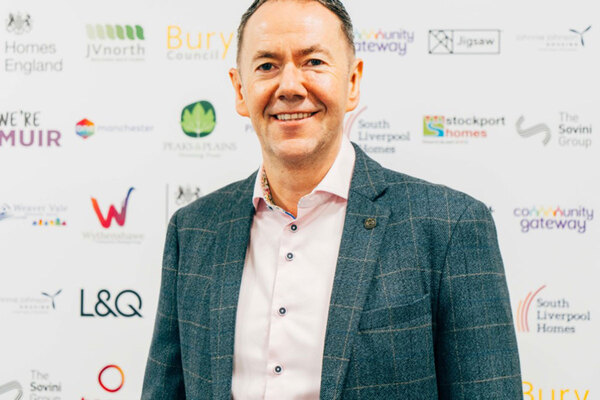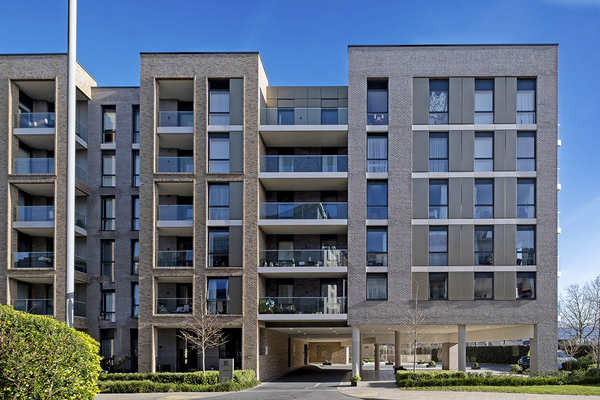The man who runs Homes England’s Affordable Homes Programme
Shahi Islam speaks to James Riding about his new role as director of Homes England’s Affordable Homes Programme and his desire to be “more front-facing” in the sector. Photography by Tim Foster

Shahi Islam is aware he may have flown under landlords’ radars until now. “Historically, we’ve maybe had a low profile,” the recently appointed director of Homes England’s £7.4bn Affordable Homes Programme (AHP) says of his team. “But I’d like to go out there and meet the sector.”
Since his appointment in January, Mr Islam has been in charge of the most important funding stream for affordable housebuilding in the UK, distributing billions of pounds in government grants to social landlords to finance their development ambitions. Now, he says, he is keen to be “more front-facing” in his dealings with housing providers – or ‘partners’ in the official wording.
In person, Mr Islam is measured, thoughtful and softly spoken. He has spent the past 11 years at Homes England, most recently as assistant director for affordable housing grants under Jackie Jacob, who retired in December 2023 after a 32-year career at the government agency. The top job is “a different type of role”, Mr Islam says. “It’s the sector wanting to meet you and showcase their work, which I’m really eager to do.”
The AHP traces its history back to the Housing Act 1964, which established Homes England’s precursor, the Housing Corporation, to provide loans to housing associations (although it would take another decade before it offered them direct public subsidy). Over the following decades, the programme has flexed to fit the political and economic landscape. Currently, Mr Islam ensures the fund is achieving Homes England’s placemaking and regeneration ambitions. Once the current programme expires in 2026, it will be his job to work with the next government to design a new AHP around its housebuilding goals.
Born in Shepherd’s Bush, Mr Islam grew up in London and studied economics at the School of Oriental and African Studies (SOAS). After completing a master’s in international management, he set his sights on becoming an accountant and joined the Housing Corporation in 2004 as a finance assistant in the London investment team, with the view that he would complete his professional training on the side.
“I was all lined up to do the exams,” he says. “[But] I was enjoying the investment programme management side of things, dealing with partners and the outcomes that were being generated. We did lots of site visits, meeting partners, meeting people who’ve moved into some of these homes. That social value stuck with me.”
This would be natural, he muses, given his time at SOAS. “I was interested in development, NGO-type work, charitable work. That has always been my background. I’m glad I fell into it as one of those roles that I applied for. Then I decided to stay in housing.”
He moved to the Greater London Authority (GLA) in 2009 and worked in affordable housing while Boris Johnson was mayor and Richard Blakeway was deputy mayor for housing. Mr Islam returned to Homes England (then called the Homes and Communities Agency) in 2013, where he has been since.
Currently, many associations use grant from both the GLA and Homes England, he observes. “While there is a border between London and the rest of England, it’s not a black-and-white border. There is lots of crossover in terms of infrastructure projects leading out of London. Some of the housing sits across borders as well.”
The current 2021-26 AHP has experienced some serious turbulence. Originally it was expected to deliver 180,000 homes, but by September 2022, the National Audit Office had revised this estimate down to 157,000. With the high inflation that followed since, total completions are now likely to be far lower.
Mr Islam says Homes England acted quickly towards the end of 2022, introducing flexibilities around tenure switching and targeted grant intervention rates. “Our primary goal was to stabilise delivery and give certainty, confidence, to the sector. I think we’ve done that,” he says. Funding from the AHP is still being allocated, but the latest official data is bleak: grant-funded affordable home starts fell 60% in the first half of the 2023-24 financial year compared with the same period a year before.
Are landlords handing back money that was allocated? “No, not in the AHP,” Mr Islam says. “A partner may have, for example, £100m to deliver X number of homes, but actually, through delivery, they may repurpose or reposition that. And yes, they might give some of it back, but it’s not because there are whole-scale delivery issues. It’s just part of the usual programme management. As they start planning on site, they’re locking in what they can deliver within our programme profiles. So yes, some partners have handed back, I’d say, low levels of grant. But that would be expected as part of the way we manage the programme.”
Do landlords tell him grant rates are not high enough? “All partners would say that,” he says with a smile. “In terms of my position, delivering the programme, we are given a defined budget and target to meet, and our role is to protect the public purse and drive value for money. Even in a good economic climate, partners will say the grants are still not high enough.”
Shahi Islam’s CV
2024-present: Director of affordable housing, Homes England
2020-present: Editorial panel member, Inside Housing
2018-2024: Head, then assistant director of affordable housing grants, Homes England
2013-2018: Manager, then senior manager for programmes and policy, Homes and Communities Agency
2009-2013: Policy officer – housing investment and strategy, Greater London Authority
2004-2009: Finance assistant, Housing Corporation
One of housing secretary Michael Gove’s goals is to see more social rent delivered through the AHP. There is not a formal target for social rent in the programme, says Mr Islam, but “we’re actively working with our partners to bring in as much social rent as we can”.
A multi-tenure programme is essential, however, “as we saw when they launched, in 2016, a shared ownership-only programme. We realised very quickly that having a mono-tenure programme wasn’t going to deliver,” he says. (The programme rapidly pivoted back to a mixed-tenure approach.)
What needs to be acknowledged, is the delivery landscape that has affected landlords’ appetite for social rent, Mr Islam says. In 2010, affordable rent was launched and “the removal, pretty much, of social rent as a key tenure”. Over the past 10 years, housing associations adapted their business plans accordingly. “We saw, when they reintroduced social rent in 2018 post-Grenfell, some of the challenges the sector had with trying to deliver social rent.”
Initially, the tenure was only relaunched in certain highly unaffordable areas. Only recently has it been possible to deliver it across the country. “Social rent is now a main tenure again, but it will take some time for the sector to build it into its business plans to deliver, and also within the planning framework, in terms of local authorities accepting it as a tenure. But we’re making good progress,” he adds.
This magazine has been campaigning for parties to do even more, with our Build Social campaign, calling on them to commit to build large numbers of homes for social rent in their manifestos at the next election.
While the AHP is Homes England’s crown jewel, Mr Islam’s role also includes designing and developing smaller, more specialised grant programmes for the government. These include the Community Housing Fund, Move On Fund, the Empty Homes Programme, a recent rough sleepers programme and the Care and Support Programme, which was run in partnership with the Department of Health and Social Care.
Smaller grants and diversity in housing
The demand for these smaller funds depends on ministers and their ambitions, Mr Islam says. “There’s always an argument whether you have large programmes [to] absorb some of the deliverables, or you have targeted programmes.”
A smaller, leaner programme can deliver outcomes faster, but a bigger programme can target bigger partners, bringing efficiencies. “It helps us manage some of that concentration risk that always exists when you’re dealing with large amounts of funding,” he adds.
In June 2023, Homes England opened the AHP to regeneration projects, and “there’s been really great interest” from landlords. Unfortunately, the move came midway through the programme, which did not leave much time for more complex sites, as projects must start by March 2025 and complete by March 2029 for strategic partners and March 2026 for everyone else.
The rules require landlords to show ‘additionality’, by building more new homes than were originally in place on the site. “What partners are telling us is that they would like full flexibility… not just for replacement stock but also to repair, refurbish and retrofit run-down estates, where, with investment, they could be repurposed. We will take that feedback in terms of what it might mean for a new programme,” he says.
Since 2020, Mr Islam has sat on Inside Housing’s Race and Housing Editorial Panel, which aims to improve the magazine’s diversity coverage. On the housing sector’s efforts to address structural inequality, he says “there have been some improvements”.
“We’re seeing more diversity in leadership roles. I don’t think we’re quite there yet in terms of being representative of the communities that we serve. But that’s well known in the sector, and lots of organisations are trying to address that.”
There are lessons from the failures that were revealed after the death of Awaab Ishak, he says. “The big question is, ‘Could some of that have been prevented if leadership teams were reflective of the local community that they’re serving?’ This is where the race panel is really important, because it does force the sector to think about some of these issues in terms of representation and decision-making that they’re doing with their tenants.”
How does Homes England stack up? The agency has done “a lot of work” since it launched its equality, diversity and inclusion (EDI) document in 2019, he says. “I don’t think it should sit on an individual’s shoulders to hold the whole EDI agenda. It’s a cross-organisational, cross-leadership piece, and there is buy-in from the leadership team.”
Mr Islam has three personal ambitions in his new role. The first is delightfully short-term, and by the time this is published, it will have been achieved. “It’s to get me through year end. We’re almost there,” he says.
His medium-term goal is to get to the end of the programme in 2026. After that? “Hopefully, there will be appetite from [the next] or a new government for a new AHP. So my main priority is to support government and the agency to design and launch a new AHP.”
Mr Islam is driven by the tangible effect of the homes his team is funding. “Some of the [poor-quality] schemes I’ve seen in my lifetime are really quite hard-hitting. I’ve seen the impact that poor-quality housing has on an individual. The main motivation that keeps me in post is knowing we’re hoping to deliver thousands of completions… They are keys that will be handed to families moving to somewhere warm and safe, secure.”
Hear more from Shahi Islam at Housing 2024 in Manchester in June, where he will be speaking about Section 106, what partnerships are needed and who benefits. Book your delegate pass at housingevent.com
Recent longform articles by James Riding
Dagenham fire: what happened and what we know about the building
A fire at a block of flats in Dagenham, east London, on Monday has sparked fresh debate about the slow progress of cladding remediation in the UK. James Riding runs through what we know so far
Peter Denton discusses the Homes England review and Section 106 jitters
Homes England’s chief executive tells James Riding that a new government review is a “call to arms” for the agency to take a more hands-on role in development
The man who runs Homes England’s Affordable Homes Programme
Shahi Islam speaks to James Riding about his new role as director of Homes England’s Affordable Homes Programme and his desire to be “more front-facing” in the sector
Sign up for our development and finance newsletter
Already have an account? Click here to manage your newsletters












